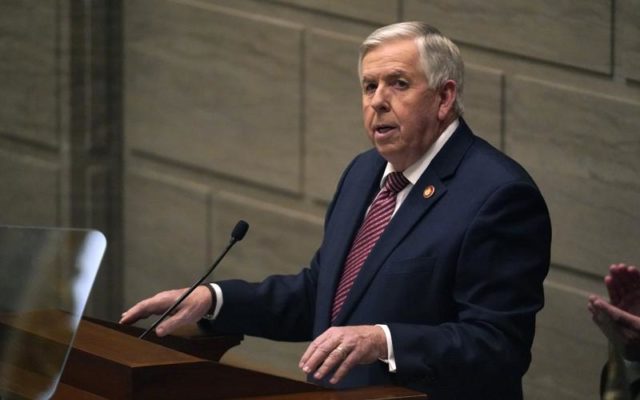THE EGGLESTON REPORT – TWO BILLS ADVANCE

Quite a few bills were discussed in the Missouri House this week. Two that advanced were bills I sponsored – one on unemployment and the other on elections.
My unemployment bill is HB1860. Employers of all types – small businesses, big companies, prisons, MoDot, nursing homes, etc. – used to say that good help is hard to find. Now they say ANY help is hard to find, as they have a lot of job openings that are going unfilled because they cannot find enough people who want to work. There are several reasons for this worker shortage, and one is the unemployed collecting unemployment until those benefits are about to run out before seriously looking for their next job. In Missouri, a recipient can receive an unemployment check for up to 20 weeks, which is one of the longer periods in the nation.
To address this, several states tie how long someone can collect unemployment to the state’s unemployment rate. When jobs are scarce and unemployment is high, it might take 20 weeks to find a job. But in times like today when jobs are plentiful, a job can be found in a much shorter time. HB1860 would vary the length of time of unemployment benefits from 8 to 20 weeks as the unemployment rate varies from below 3.5% to above 9%. Currently, Missouri’s rate is 3.7%. If passed, HB1860 would help get those out of work back to work, help employers fill their job openings, and help Missouri’s economy further improve.
With some amendments, my elections bill HB1859 has evolved into one on election integrity. Specifically, it would put an end to ballot drop boxes and require paper ballots. Drop boxes are like street corner mail boxes for absentee ballots, locked but unattended. The concern is that a bad actor could either stuff them with fraudulent ballots or vandalize/steal the ballots inside to try to compromise an election. And voting on paper ballots is considered far more secure than voting on an iPad where hackers or a computer glitch might manipulate the voting data. And in the event of a recount, having tangible paper ballots is far better than relying on computerized data. Voters need to know that the reported results of an election are accurate, and HB1859 improves our election integrity and voter confidence.
These bills will now advance to the senate and will need to be approved there in the next four weeks. As always, if you have any questions about any bill, please email me at [email protected]. Until next time, best wishes of safety, health and prosperity to you and your family.
PICTURES FROM THE CAPITOL

Students from North Central Career Center in Bethany tour the capitol
FROM THE CAPITOL NEWS DESK
House Approves Legislation to Create Parents’ Bill of Rights (HB 1858)
The members of the Missouri House have approved legislation that would give parents a greater say in the education their children receive. The House gave first-round approval to HB 1858, which creates the Parents’ Bill of Rights Act of 2022.
The bill’s sponsor said the bill meant to address the concerns of parents who “are not happy with what is happening in the classroom with their children.” He added, “Many times they are left with no recourse. School boards are not being responsive. There are situations where parents are being ignored, not listened to.” He said his bill “empowers parents. I think it empowers them to be able to be engaged in their student’s education.” He also noted that 11 states currently have similar laws outlining parental rights.
HB 1858 provides a list of rights that parents may require school districts to follow. Some of the parental rights outlined in the bill include the right to review curricula, books and instructional materials; the right to visit school during school hours with restrictions; and the right to have sufficient accountability and transparency regarding school boards.
The bill’s sponsor said, “There are a lot of things that could entail when it comes to things that are being taught in the classroom. Whether it’s age-inappropriate material, whether it’s books that should not be in front of students at those ages, or whether it’s critical race theory. Some of the things that are happening, we have to address.”
The bill also prohibits school districts from requiring nondisclosure agreements for a parent’s review of curricula or individualized education program meetings. It would restrict schools from collecting biometric data or other sensitive personal information about a minor child without obtaining parental consent. Additionally, it would require school board meetings dealing with curricula or general safety to take place in public and allow for public comments.
An amendment added during discussion on the bill specifies that no school or school employee can compel a teacher or student to personally adopt or affirm ideas in violation of Title IV or Title VI of the federal Civil Rights Act of 1964. This would include ideas such as individuals of any race, ethnicity, color, or national origin are inherently superior or inferior; or that individuals, by virtue of their race, ethnicity, color, or national origin, bear collective guilt and are inherently responsible for actions committed in the past by other members of the same race, ethnicity, color, or national origin.
The sponsor of the amendment said, “We’re making sure that teachers and students are not being compelled into believing certain ideas; not that they can’t teach those ideas. You can teach about controversial ideas that might cause people discomfort but you can’t force people to agree to those ideas.”
The amendment sponsor added, “We should not have collective racial guilt, but we should not have collective amnesia, or collective racial amnesia. What I think we ought to do is we ought to have collective pride.”
The bill also allows parents to file a civil lawsuit against a school district or school that violates the Parents’ Bill of Rights. Other provisions in the bill would require the Department of Elementary and Secondary Education to develop an online database that provides access to every school district’s curriculum and professional development materials; require the salaries of public school employees to be included in the state accountability portal; and require school boards to provide a time for an open forum at the beginning of each board meeting and allows parents to bring civil action against school districts that violate the policy.
The bill requires another vote in the House before moving to the Senate.
House Leadership Announces Plan to Provide Economic Relief to Working Missourians (HB 3021)
Members of House Leadership and the chairman of the House Budget Committee want to help working Missourians afford the ever-increasing cost of living. The Budget Committee chairman filed legislation this week that would create a one-time economic recovery tax credit for Missouri residents who paid personal income tax in the state for 2021. The plan immediately gained the support of the members of House leadership.
HB 3021 will appropriate $1 billion from the state’s General Revenue Fund to fund a one-time economic recovery non-refundable tax credit. Under the plan, anyone filing an individual Missouri personal income tax return would receive up to a $500 credit. Married couples filing jointly would receive up to a $1,000 credit. The credit is limited to individuals who were a Missouri resident for the entire tax year.
“As families struggle to make ends meet with the rising cost of inflation, it’s important that we do everything we can to help them keep more of their hard-earned dollars. The state is fortunate to have a record surplus that we can use a portion of to provide direct economic relief to working Missourians,” said the House Budget chairman.
The members of House Leadership issued a joint statement saying, “As a caucus we have made it clear that we do not support the idea of spending every available dollar to increase the size of government, but instead believe individual Missourians are the best decision makers for how to spend their tax dollars.”
The Speaker of the Missouri House of Representatives noted that he and the House Budget Committee chairman have worked together over the past few months to find the best solution for providing substantive relief to working Missourians. He added that HB 3021 will be a legislative priority for the House in the final weeks of session. The bill has already received a public hearing in the House Budget Committee.
Bills Sent to the Senate
HB 1637 is a wide-ranging piece of legislation with numerous preventions designed to prevent crime in Missouri. The original intent of the bill was to clarify that a person commits the offense of mail theft if the person purposefully takes mail from another person’s mailbox or premises without the consent of the addressee and with intent to deprive the addressee of the mail. The offense of mail theft would be a class A misdemeanor for a first offense and a class E felony for a second or subsequent offense. Supporters say this would help ensure clarity and consistency in application of the law. Law enforcement pointed out inconsistencies and issues with current law so there are unfortunately lots of these cases that are left unprosecuted. Some of the other provisions added to the bill would create a violent offender registry, establish offenses related to teller machines, create the offense of unlawfully gaining entry to a motor vehicle, create the offense of unlawfully discharging a firearm, and take steps to prevent abuse and neglect in nursing homes.
HB 2307 establishes a $5,000 fine that will be assessed and collected in all cases in which a defendant is found guilty of any human trafficking offense. The bill also creates the “Human Trafficking and Sexual Exploitation Fund” which will consist of proceeds from the human trafficking fine collected. Moneys in this fund will be distributed to the county where the human trafficking offense occurred. Counties will allocate funds for rehabilitation services for victims of trafficking, and for efforts to prevent human trafficking.
HB 1757 establishes the “State Building Usage Task Force”. The duties of the Task Force will be to evaluate the conditions of all state government-owned and leased real properties, as well as the current funding received for maintaining each real property. Real properties owned and leased by public schools are excluded from the Task Force’s evaluations. Supporters say the bill will help identify vacant and underutilized buildings and encourage a decision on the sale or transfer of such properties.
HB 2593 prohibits political subdivisions from restricting the operation of a “no-impact home-based business” or otherwise requiring a person to apply for or obtain a permit, license, variance, or other prior approval to operate a no-impact home-based business. The bill establishes a list of factors that qualify a home-based business as a no-impact home-based business. Political subdivisions can establish reasonable regulations on a home-based business if the regulations are narrowly tailored for specified purposes, including protecting public health and safety.
HB 1860 changes the average unemployment rate requirement in order for an insured worker to receive unemployment compensation benefits. At an unemployment rate of 3.5% or less, individuals could receive 8 weeks of benefits. Individuals could receive a maximum of 20 weeks of benefits if the unemployment rate is higher than 9%. Supporters say the bill ties benefits to the unemployment rate and makes it so when jobs are plentiful, benefits are reduced, and when jobs are scarce, benefits remain high.
HB 1583 prohibits a political subdivision or election authority from describing any proposed tax on property in a political subdivision as not increasing taxes, or any language to that effect, unless both: (1) failing to adopt the proposed measure would cause an actual increase in the tax rate; and (2) adopting the measure would cause the tax rate to stay the same or decrease. The bill requires that if the voters in a political subdivision approve an increase to the tax rate ceiling prior to the expiration of a previously approved temporary levy increase, the new tax rate ceiling shall remain in effect only until such time as the temporary levy increase expires under the terms originally approved by a vote of the people, at which time the tax rate ceiling shall be decreased by the amount of the temporary levy increase unless voters of the political subdivision are asked to approve an additional permanent increase and such increase is approved. Supporters claim the bill makes government more transparent, and say it addresses a situation that happens across the state with numerous school districts.
HB 2623 modifies provisions relating to required background checks of individuals employed by or associated with licensed residential care facilities, child placing agencies, or residential care facilities. The bill repeals the requirement that a background check include a search of the National Sex-Offender Registry. Additionally, under current law, all owners, officers, managers, contractors, employees, and other support staff of licensed or certified medical marijuana facilities must submit fingerprints to the State Highway Patrol for state and federal criminal background checks. The Department of Health and Senior Services may require fingerprint submissions of owners, officers, managers, contractors, employees, and other support staff for licensure authorizing that person to own or work at a medical marijuana facility. The bill limits those individuals that must submit to such fingerprinting to employees, contractors, owners, and volunteers.
HB 1705 specifies that the State Highway Patrol must maintain on its website a registry for violent offenders who are on probation or parole for the offense of first or second degree murder in Missouri or for an equivalent offense in any other state. Supporters say the bill adds to the Sex Offender Registry a registry for people on parole for second degree murder. The people would come off the Registry once their parole is over. It does not mix the data. It is a separate column that can be searched separately. The purpose is to allow the public to know who is on parole for second degree murder because there are times where that information would be very useful.
HB 2218 modifies provisions relating to the Municipal Land Reutilization Law. Supporters say the bill will make it quicker and easier to deal with damaged, dilapidated, and abandoned property, and to clean up the title to make the properties more saleable.
HB 2331 repeals provisions relating to certain health and licensing requirements. The bill repeals sections in current law dealing with frozen dessert licensure and perinatal substance abuse. Supporters say this is an unneeded license. The ice cream manufacturers already have to pass inspections and live up to regulations. The bill also eliminates a physician regulation that is obsolete. Beginning January 1, 2023, the bill creates a tax credit for any community-based faculty preceptor, who serves as the community-based faculty preceptor for a medical student core preceptorship or a physician assistant student core preceptorship. The bill modifies provisions relating to the Organ Donor Program Fund. The bill provides no hospital, physician, procurement organization, or other person may consider COVID-19 vaccination status of a potential organ transplant recipient or donor at any stage in organ transplant processing. The bill allows physical therapists to evaluate and initiate treatment on a patient without a prescription or referral from an approved health care provider. The bill modifies several provisions relating to the administration of medications by pharmacists. The bill changes inspection requirements for licensed hospitals, certified hospices, and long-term care facilities.
HB 2376 determines that the residency of children in state custody for the purpose of determining state and local funding shall be determined by the location of where the child resides. If a child resides in a residential treatment facility and is unable to attend the resident public school due to safety or behavioral concerns, and the residential facility provides the education for the child, the facility is entitled to at least 80% of all state money paid to the resident district on a per-pupil basis along with any addition funding provided through the Department of Elementary and Secondary Education. Supporters say the bill helps foster children that for certain reasons cannot attend classes at a public school to receive educational services at their residential care facility. The bill also includes provisions dealing with gifted children, early learning quality assistance, neighborhood youth development programs, and child care facilities.



